We are encouraging everyone to travel more frequently by bus, train and tram rather than by car.
Fewer cars on the road will reduce harmful emissions as well as improve congestion in the city-region.
Cycling and walking are the most environmentally-friendly ways to get around. They're good for your health, and produce no harmful pollution.
But if you can't make your journey by foot or by bike, using public transport can help reduce your environmental impact environment.
Greater Manchester also currently has more than 3,500 park and ride spaces for people who need to drive to their local Metrolink stop, train station or bus service.
Metrolink
More and more people are choosing to travel by tram. Metrolink now carries more than 44 million passenger journeys a year.
That’s good news for Greater Manchester as our trams emit no local air pollution.
Each tram can carry 200 passengers – that’s far less fuel per passenger than cars or buses.
Metrolink now runs to 93 stops across Greater Manchester. Frequent, reliable services run on seven lines, covering around 60 miles.
Find out if you can make Metrolink part of your journey.
Metrolink’s cleaner, greener energy
The Metrolink service is powered entirely by electricity produced from modern, cleaner, greener energy sources.
62% of a tram’s power comes from energy produced by the wind. The rest is from other environmentally friendly sources like recycling waste, water power and burning natural fuel like woodchips and grass.
Metrolink is friendly to the environment in many other ways, too:
- Trams produce no exhaust fumes.
- Trams cause very little noise, except when they sound a horn to warn pedestrians and traffic.
- Trams have steel wheels – which last longer and can be recycled with much less environmental impact than old rubber tyres.
Protecting the environment
We work closely with Greater Manchester’s tram network operator KeolisAmey Metrolink (KAM) to protect the local environment.
Metrolink provides energy consumption data for our annual carbon footprint report.
Metrolink’s day-to-day operations use energy sources such as natural gas, electricity and diesel. These emissions accounted for around 40% of
TfGM’s carbon footprint in 2016-17.
We’re working with KAM to reduce the amount of carbon dioxide equivalent (CO2e) produced by Metrolink through a Carbon Management Plan and operational changes.
Metrolink travels through many green areas of Greater Manchester. KAM also has a vegetation management programme in place by to sensitively look after areas along the track.
If you have any questions about this, please contact Metrolink on 0161 244 1000.
Bus
Travelling by bus is great for the environment and can also be good for your health.
A typical double decker bus can carry at least 60 passengers, no doubt reducing harmful emissions had those people chosen to drive.
Congestion costs the UK economy at least £11 billion each year. If everyone switched just one car journey a month to bus that would be one billion fewer car journeys on our roads, and a saving of 2 million tonnes of CO2.
Bus travel can also help reduce stress linked to commuting by car and encourage a more active lifestyle. Getting off the bus a stop or two earlier can be an easy way of building up your physical activity.
Greater Manchester’s green buses
Greater Manchester has an ambition to move to a zero-emission bus fleet and we’re working with local bus operators to reduce emissions from buses.
We’ve also worked with bus operators to take advantage of Government vehicle funding competitions for greener vehicles.
There are now more than 250 buses in Greater Manchester with Euro VI engines.
TfGM alone has a fleet of 101 environmentally-friendly diesel-electric hybrid buses and three fully electric buses.
Some of these are run on the Manchester city centre, Bolton and Stockport town centre Metroshuttle services, which are all electric or diesel-hybrid.
And 52 buses in our 87-strong Yellow School Bus fleet are also diesel-hybrid. The remainder have been fitted with the latest equipment to reduce pollution from the tailpipe.
We also lease green vehicles to the local bus operators that run services that we financially support on the general bus network.
We continue to bid for more Government funding to improve the local bus fleet and in February 2018 we made a successful £3million bid to the DfT’s Clean Bus Technology Fund.
Read more about our latest multi-million pound bid to the Government’s Ultra Low Emission Bus Scheme for funding to help run 64 more new electric buses.
Reporting buses with engines left running
Buses left with their engines running cause unnecessary air pollution.
Under law it’s an offence to leave an engine running unnecessarily. At our bus stations, we require drivers to turn off bus engines if they’re likely to be waiting for more than five minutes.
If a bus is causing a nuisance by standing with its engine running elsewhere, you can contact the local council environmental health department.
You will need to provide full details, including registration, date, time and location. They can then issue a fixed penalty notice to the driver.
Trains
Rail travel in Greater Manchester is growing, with over 27 million passenger journeys a year.
Trains are powered either by electricity or by diesel fuel. Importantly, they can carry hundreds of people per journey.
Over the next couple of years, Greater Manchester’s train operators are investing in brand new, longer trains.
These will not only be greener than older units but will also offer more seats for more people to choose train travel.
Greater Manchester continues to press government for further investment to make train travel even greener.
We want more of the rail network to be electrified and funding for new rolling stock technologies which could further reduce carbon emissions.
We are also working to further develop freight routes and logistics facilities – such as Port Salford – to encourage suppliers to move more goods by rail than by road.
Find out if you can make rail part of your journey.
-
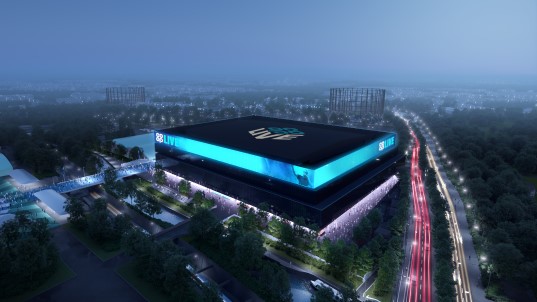 Learn more about getting to Co-op Live
Learn more about getting to Co-op LiveTravel included with Co-op Live tickets
Co-op Live ticket holders can travel on the tram and new city centre shuttle buses.
-
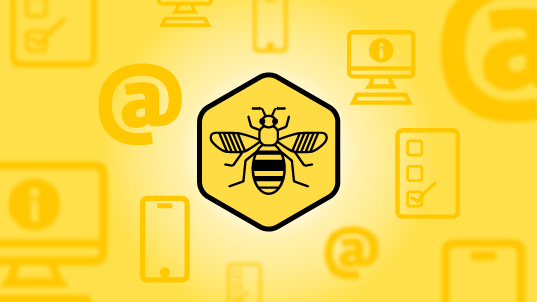 Learn more about the Bee Network
Learn more about the Bee NetworkSay yellow to the Bee Network
Buses in Oldham, Rochdale and parts of Bury, Salford and north Manchester joined the Bee Network on 24 March.
-
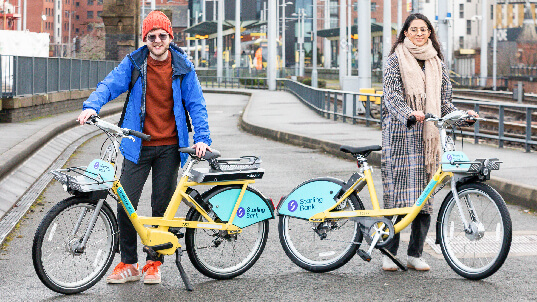 Learn more about new Starling Bank Bikes
Learn more about new Starling Bank BikesNew sponsor: Starling Bank Bikes
We’re delighted to welcome Starling Bank on board as the new sponsors of our bike hire scheme.
-
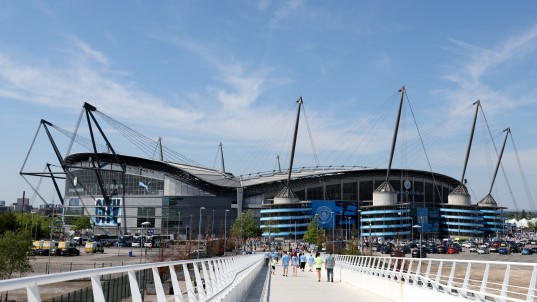 Find full details of the bus routes, ticket fares and timetables
Find full details of the bus routes, ticket fares and timetablesManchester City Matchday Buses
We've teamed up with Manchester City to launch a large-scale bus trial helping fans from across Greater Manchester and nearby areas to travel to and from the Etihad Stadium on a matchday.
-
 Rate your journey
Rate your journeyRate your journey
We want to hear your views to help us deliver a better Bee Network for Greater Manchester.
-
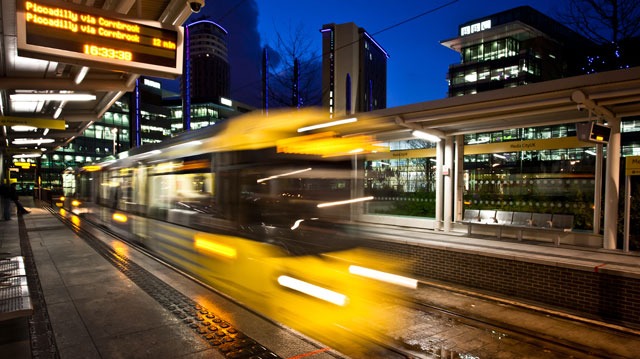 Find out about planned works on the tram
Find out about planned works on the tramPlanned engineering works on Metrolink
Visit our dedicated webpage to find out how the works could affect your journeys.
-
 Learn more about getting to Co-op Live
Learn more about getting to Co-op LiveTravel included with Co-op Live tickets
Co-op Live ticket holders can travel on the tram and new city centre shuttle buses.
-
 Learn more about new Starling Bank Bikes
Learn more about new Starling Bank BikesNew sponsor: Starling Bank Bikes
We’re delighted to welcome Starling Bank on board as the new sponsors of our bike hire scheme.
-
 Rate your journey
Rate your journeyRate your journey
We want to hear your views to help us deliver a better Bee Network for Greater Manchester.
-
 Learn more about the Bee Network
Learn more about the Bee NetworkSay yellow to the Bee Network
Buses in Oldham, Rochdale and parts of Bury, Salford and north Manchester joined the Bee Network on 24 March.
-
 Find full details of the bus routes, ticket fares and timetables
Find full details of the bus routes, ticket fares and timetablesManchester City Matchday Buses
We've teamed up with Manchester City to launch a large-scale bus trial helping fans from across Greater Manchester and nearby areas to travel to and from the Etihad Stadium on a matchday.
-
 Find out about planned works on the tram
Find out about planned works on the tramPlanned engineering works on Metrolink
Visit our dedicated webpage to find out how the works could affect your journeys.





